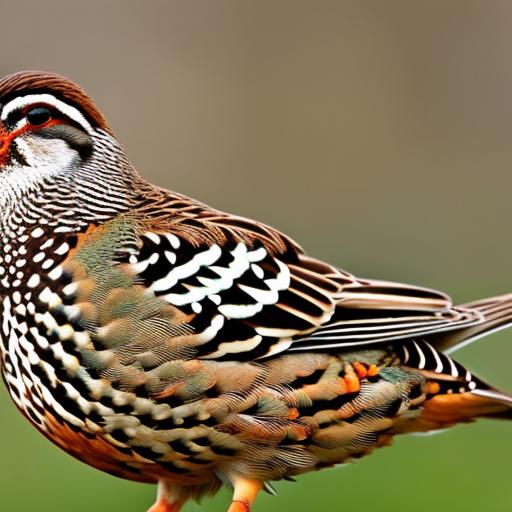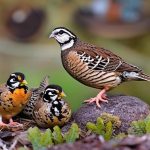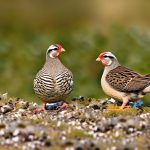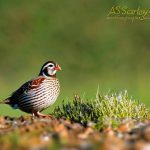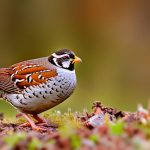Quail keeping is a rewarding and enjoyable hobby that has been gaining popularity in recent years. Quails are small, ground-dwelling birds that are known for their delicious eggs and meat. They are relatively easy to care for and can be kept in a backyard or small farm setting. Quails come in various breeds, including the popular Coturnix quail, which is known for its high egg production and gentle nature. Whether you are interested in raising quails for their eggs, meat, or simply as pets, quail keeping can be a fulfilling and sustainable endeavor.
Quail keeping can be a great option for those who have limited space or live in urban areas, as quails require minimal space compared to other poultry. Additionally, quails are relatively low maintenance and can thrive in a variety of climates. With the right knowledge and preparation, quail keeping can be a fun and educational experience for individuals and families alike. In this comprehensive guide, we will explore the various aspects of quail keeping, including housing and enclosure requirements, feeding and nutrition, health and disease management, breeding and reproduction, as well as quail behavior and socialization. Whether you are a beginner or an experienced quail keeper, this guide will provide valuable insights and tips for successfully raising and caring for quails.
Key Takeaways
- Quail keeping is a rewarding hobby that requires proper knowledge and care to ensure the well-being of the birds.
- Quails require a secure and spacious enclosure with proper ventilation and protection from predators.
- A balanced diet including commercial quail feed, fresh water, and occasional treats is essential for the health and productivity of quails.
- Regular health checks, cleanliness, and disease prevention measures are crucial for maintaining a healthy quail flock.
- Understanding quail breeding behavior and providing suitable nesting areas are important for successful reproduction and raising of quail chicks.
Housing and Enclosure Requirements for Quails
When it comes to housing and enclosure requirements for quails, there are several key factors to consider. Firstly, it is important to provide adequate space for your quails to move around and exhibit natural behaviors. A general rule of thumb is to allow at least 1 square foot of space per quail in the enclosure. This will ensure that the quails have enough room to forage, dust bathe, and socialize with each other. Additionally, the enclosure should be secure and predator-proof to protect the quails from potential threats such as predators and extreme weather conditions.
The type of enclosure will depend on the number of quails you plan to keep and the available space on your property. For smaller flocks, a simple wire mesh cage or hutch may suffice, while larger flocks may require a dedicated quail coop or aviary. It is important to provide adequate ventilation and natural light in the enclosure to promote good health and well-being for the quails. Additionally, the flooring of the enclosure should be covered with a suitable substrate such as straw or wood shavings to absorb moisture and provide a comfortable surface for the quails to walk on. By providing a spacious, secure, and well-ventilated enclosure, you can ensure that your quails have a safe and comfortable living environment.
Feeding and Nutrition for Quails
Feeding and nutrition are crucial aspects of quail keeping that directly impact the health and productivity of the birds. Quails are omnivorous birds that require a balanced diet consisting of high-quality feed, fresh water, and occasional treats. A commercial game bird feed or quail feed is recommended as the primary source of nutrition for quails, as it is specially formulated to meet their dietary needs. The feed should contain a balanced combination of protein, carbohydrates, vitamins, and minerals to support growth, egg production, and overall health.
In addition to commercial feed, quails can also benefit from supplemental treats such as fresh fruits, vegetables, mealworms, and greens. These treats can be offered in moderation as a source of enrichment and variety in their diet. It is important to provide fresh water at all times, either through a gravity-fed waterer or shallow dish that is easily accessible to the quails. Proper hydration is essential for quail health and egg production. Additionally, it is important to monitor the quails’ feed intake and adjust the feeding regimen as needed based on their age, activity level, and seasonal changes. By providing a balanced diet and access to fresh water, you can ensure that your quails remain healthy and productive.
Health and Disease Management for Quails
Maintaining the health of your quails is essential for their well-being and longevity. Preventative measures such as good hygiene, proper nutrition, and regular health checks can help minimize the risk of diseases and health issues in your quail flock. It is important to keep the quail enclosure clean and free of droppings, spilled feed, and debris that can attract pests and harbor harmful bacteria. Regularly cleaning and disinfecting the enclosure, feeders, and waterers can help prevent the spread of diseases and parasites.
In addition to good hygiene practices, it is important to monitor the quails for any signs of illness or distress. Common signs of illness in quails include lethargy, decreased appetite, abnormal droppings, respiratory issues, or changes in behavior. If you notice any of these symptoms, it is important to seek veterinary care promptly to diagnose and treat any potential health issues. Additionally, it is important to quarantine any new birds before introducing them to an existing flock to prevent the spread of diseases. By practicing good hygiene, monitoring for signs of illness, and seeking prompt veterinary care when needed, you can help ensure the health and well-being of your quail flock.
Breeding and Reproduction of Quails
Breeding and reproduction are natural behaviors that can occur in a quail flock under the right conditions. Quails reach sexual maturity at around 6-8 weeks of age, at which point they may begin laying eggs or displaying courtship behaviors. If you are interested in breeding quails, it is important to provide suitable nesting areas within the enclosure where the female quails can lay their eggs in privacy. A simple nesting box filled with clean straw or shavings can provide a comfortable and secure environment for egg-laying.
Once the eggs are laid, they should be collected daily to prevent breakage or contamination. The eggs can be incubated using a commercial incubator or by a broody hen if available. The incubation period for quail eggs is approximately 17-18 days, after which the chicks will hatch. It is important to provide a warm and safe brooding area for the newly hatched chicks, complete with a heat source, clean bedding, and access to fresh water and chick starter feed.
As the chicks grow, they will require additional space and access to suitable feed for their development. It is important to monitor the chicks for any signs of illness or weakness and provide appropriate care as needed. By providing suitable nesting areas, collecting eggs promptly, providing proper incubation and brooding conditions, as well as monitoring the health of the chicks, you can successfully breed and raise healthy quail offspring.
Quail Behavior and Socialization
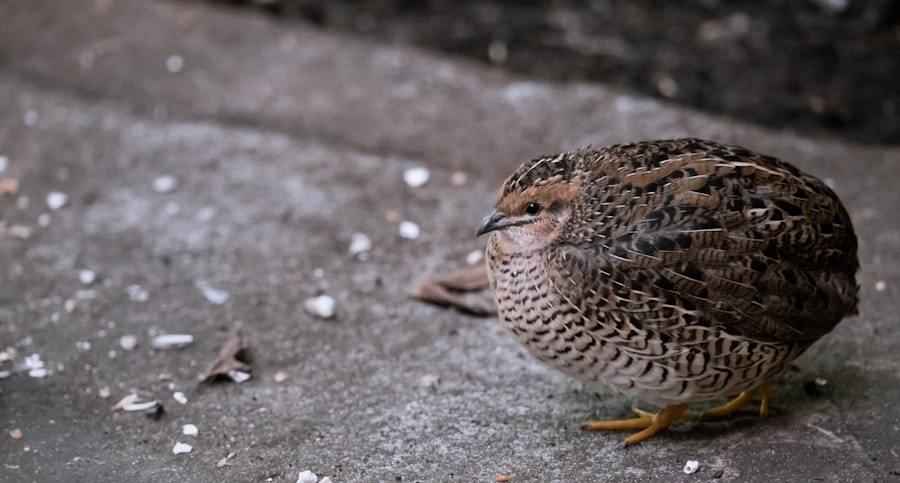
Quails are social birds that thrive in flocks and exhibit various natural behaviors such as foraging, dust bathing, preening, and vocalizing. It is important to provide suitable enrichment within the enclosure to encourage these natural behaviors and promote overall well-being for the quails. This can include providing access to natural materials such as branches, logs, or rocks for perching and scratching, as well as areas of loose soil or sand for dust bathing.
Quails are generally peaceful birds that get along well with each other when provided with adequate space and resources. However, it is important to monitor the flock for any signs of aggression or bullying, especially during introductions of new birds or during breeding season. Providing multiple feeding and watering stations within the enclosure can help minimize competition for resources and reduce potential conflicts within the flock.
Additionally, spending time observing your quails’ behavior can provide valuable insights into their health and well-being. By paying attention to their vocalizations, body language, and interactions with each other, you can better understand their social dynamics and identify any potential issues within the flock. Overall, providing a spacious and enriched environment while monitoring their behavior can help promote positive socialization and overall happiness for your quail flock.
Is Quail Keeping Right for You?
In conclusion, quail keeping can be a rewarding and enjoyable hobby for individuals interested in sustainable food production or simply as pets. With proper knowledge and preparation, quail keeping can be relatively low maintenance compared to other poultry species while still providing valuable resources such as eggs or meat. However, it is important to consider the time commitment required for daily care and maintenance of the quail flock.
Additionally, it is important to check local regulations regarding keeping quails in your area before starting your own flock. Some areas may have restrictions on poultry keeping or specific requirements for housing and care standards that need to be met.
Overall, if you are willing to invest time in learning about proper care requirements for quails while providing them with a suitable living environment, then quail keeping may be right for you. Whether you are interested in raising quails for their eggs or meat production or simply enjoy observing their natural behaviors in your backyard or small farm setting, quail keeping can be a fulfilling experience for individuals of all ages.
If you’re interested in learning about the ease of keeping quails, you might also want to check out this insightful article on chicken coop interior ideas. It offers valuable tips and inspiration for creating a comfortable and functional living space for your poultry, which can be applicable to quails as well.
FAQs
What are quails?
Quails are small ground-dwelling birds that are often kept for their eggs and meat. They are known for their hardiness and adaptability to various environments.
How easy are quails to keep?
Quails are relatively easy to keep, as they require minimal space and can be housed in a small backyard or even in an indoor setup. They are also low-maintenance and can thrive on a simple diet of commercial quail feed and water.
What kind of housing do quails need?
Quails can be housed in a variety of setups, including cages, aviaries, or coops. They require protection from predators and the elements, as well as access to clean bedding and nesting areas.
What do quails eat?
Quails primarily eat commercial quail feed, which is formulated to meet their nutritional needs. They can also be supplemented with fresh greens, insects, and grit for digestion.
Do quails require special care or attention?
Quails are generally hardy birds and do not require extensive care or attention. However, they do need regular access to clean water, protection from predators, and a clean living environment.
Are quails noisy or smelly?
Quails are relatively quiet birds and do not produce loud noises like chickens or other poultry. They also do not produce strong odors, making them suitable for urban or suburban settings.
Meet Walter, the feathered-friend fanatic of Florida! Nestled in the sunshine state, Walter struts through life with his feathered companions, clucking his way to happiness. With a coop that’s fancier than a five-star hotel, he’s the Don Juan of the chicken world. When he’s not teaching his hens to do the cha-cha, you’ll find him in a heated debate with his prized rooster, Sir Clucks-a-Lot. Walter’s poultry passion is no yolk; he’s the sunny-side-up guy you never knew you needed in your flock of friends!

